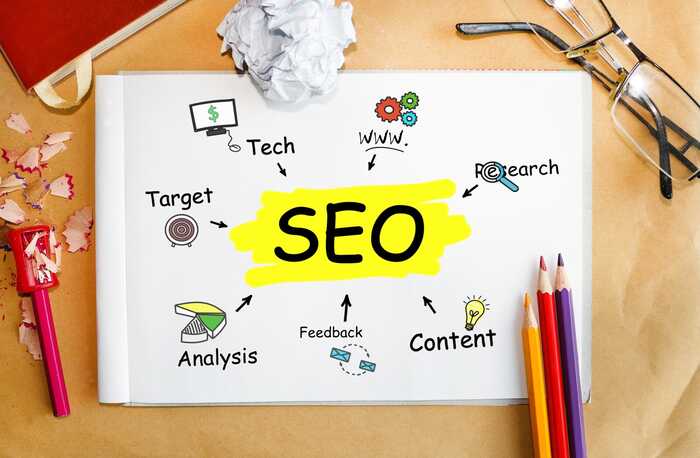5 SEO Tips for Small Business Websites
SEO (Search Engine Optimisation) is a very big topic. If you're looking for some quick SEO wins for your website that you can do yourself then this blog is for you!

Search Engine Optimisation
NounA variety of activities on a website which works towards increasing the quantity and quality of traffic to your website through organic search engine results.
Why Bother With SEO?
SEO is a great way to increase your leads for a relatively low cost (compared to other marketing activity). You already need a website so that people believe in the legitimacy of your business and can find out details about your products or services, about the company and opening times etc. So the main cost of building a website should already be invested for those core business reasons.
Now you've invested in a shiny, exciting website wouldn't it be nice if the leads and customers just came to you?
Think of your SEO in two ways:
- Firstly your set up is important. Your website needs to be built in an SEO friendly way. The codebase behind the scenes, for example, can make a real difference to SEO - it's the language that search engines speak, so it's important it's written in the correct way. At Sonder, we build all of our sites with SEO in mind so from the very start your site will tick all the technical boxes that Google like to see. There are design choices that you can make which will affect your SEO - our design team would always guide you on any key decisions as the site is being built. Your content is also key, for example ideally you need to have at least 300 words for every page and use keywords throughout the site.
- Secondly, you need an ongoing SEO strategy. Even if you build your site perfectly, it will deteriorate over time. It's important to update your website regularly and to make sure you amend keywords which are no longer used as often, pick up any relevant new terms customers are searching for and stay ahead of any technical requirements. It's an ongoing process and one that never really stops. Don't forget, it's not just your business that wants to be on the first page of Google for your services.
The best option, as always, is to hire an expert. We have SEO packages from £100 per month and we take this headache off your hands. However...
SEO Quick Wins for Small Business Websites in 2020
Here's a round up of 5 SEO hints tips to improve your website quickly, without huge technical audits or expert hand-holding.
Keywords
Assuming you don't have access to advanced software to help identify the most effective keywords, you can still come up with some good targets simply by knowing your audience. Here's some tips to identify the right keywords for a small business site
- Think specific, you're not going to be competing with Amazon for broad keywords like 'buy books online' - what's your niche? Popular subcategorising of anything at the moment are words like vegan, homemade, personalised etc.
- Think about your audience, you've surely met your customers by now, how do they speak? What words do they use to describe your products?
- Think about the topic in it's wider context. For example, on a webpage about curtains you would expect some references to windows, curtain poles, fabric types. Try and write around your topic as well as specifically about it.
Once you've nailed down a few great options for keywords you need to match them to the pages of your site and then make sure you include them in the titles, text and any bullet pointed lists. Don't overdo it, it still needs to be readable for the human visitors!
Content
This is absolutely where most small business websites fall down. We're looking for a minimum of 300 words per page, but generally speaking the more relevant content the more likely your page will rank. Get creative, there's always something you can write about for even the least exciting products and services. Here's some great content mines you might want to consider getting into the text of your site to boost the numbers:
- PDFs - do you have loads of content hidden in PDFs or other documents around the site? In most cases this content would be much better purposed on the site itself as text. The best part is that as long as it's unique content owned by your company you can just copy and paste it all onto the website.
- Sales docs - do you have a lovely brochure or leaflet that you give to the real humans you encounter? It's a bit rude not to share that with your online customers too! Again so long as this is your companies content you can just take this wording and add it to the site where it fits in with the existing content.
- Phone scripts - sometimes these are formal documents but often they are just in the head of whoever answers your phone. What do people always ask you? What classic responses have you honed and perfected over the years? There will be a place for all this information on your website and your online customers may then buy online without needing you to go through everything over the phone - saving you time and money.
The best thing about content is, once you've bothered to get it all down in text, you can reuse it in various places, this is called content marketing.
Images
All your images need Alt Tags. It's so much easier to do this as you go rather than having to fill in 239 alt tags in one go (trust me) so whenever you upload an image to your website there will be an option add an Alt Tag, which can be a field with any of these names but it all means the same thing:
- Alt Tag
- Alt Text
- Image Tag
- Alt Attribute
- Alternative Image Title
Because what makes something complicated and technical even more fun? When no one can agree on a name...
Your alt tag simply needs to describe the image, you're looking for something along the lines of 'A bottle of [brand] moisturiser surrounded by the herbs it contains: thyme, mint, unicorns'. That's the level of detail, and it should give you the opportunity to add some of the keywords you identified earlier, but don't force it if they don't sound natural.
Internal linking
This one should be nice and easy for you. Go through the content on your website and see if there is any text that naturally links to the content of another page. Then add the link. Repeat as many times as possible. Think of it as search engine 'spiders' like to have a nice web of links around the site to crawl over. It pieces the website together and helps search engines understand how the pages of your site relate to one another. Bonus tip: The anchor text you use in the link is a great opportunity to use different keywords.
Title Tags
Each page on your site has a title tag, it's not the heading at the top of the page content, it's more like the document title for a word doc and you'll be able to edit it within the CMS. This one can have a few names:
- Meta Title
- Meta Title Tag
- Title Tag
This is another area you're going to need some keywords, that's why they're at the start. Classic meta tags are organised like this '[main page content] | [secondary terms] | [brand name]' so it may look something like 'SEO Services | Search Engine Optimisation | Sonder'.
So you want to use your keywords here and you need to be careful not to make it too long. You can lose your brand name from the end if you're running out of space, you want to go for a maximum of 60 characters (including spaces).
If you want to be more exact you can use this tool to check the pixel width as it's actually a pixel width maximum that equates to roughly 60 characters.
How Are You Feeling Now?
If you're keen for more then check out all our other resources, we have blogs about Citations, Top 3 Reasons You Don't Rank and other SEO hints and tips on how to boost your SEO.

Or Have You Had Enough?
If all this SEO chat has sent you into a bit of a head spin then just get in touch, we're happy to give you a quick review of your SEO completely free - so you can find out exactly how you're doing now. Let us know your website details and one of our SEO specialists will provide a personalised video audit and send it over via email.
If you really want organic leads to increase then the steps above will help your website to rank (assuming there's no big technical problems with your site). If you're website was built recently by a reputable company then you can normally expect that side of things to be up to current Google guidelines.
If you want more organic leads and don't have the expertise or know-how, then we can take a look at the site and how much we think it will take to get you up there on some terms with a high Search Volume (the number of people that search that term on average each month) and let you know which of our packages we recommend.
Typically for a small company you'll want a gradual increase in organic traffic from a targeted audience who are likely to purchase, and our Inform SEO package will get you where you need to be. Feel free to get in touch about our expert SEO services, we'd love to help!
Other Relevant Resources
There's always more to learn, we recommend these blogs:
Posted on July 20th 2020




